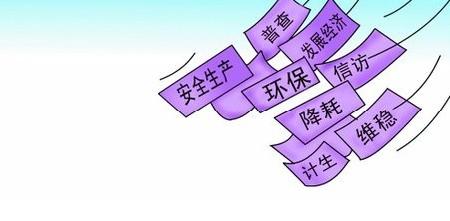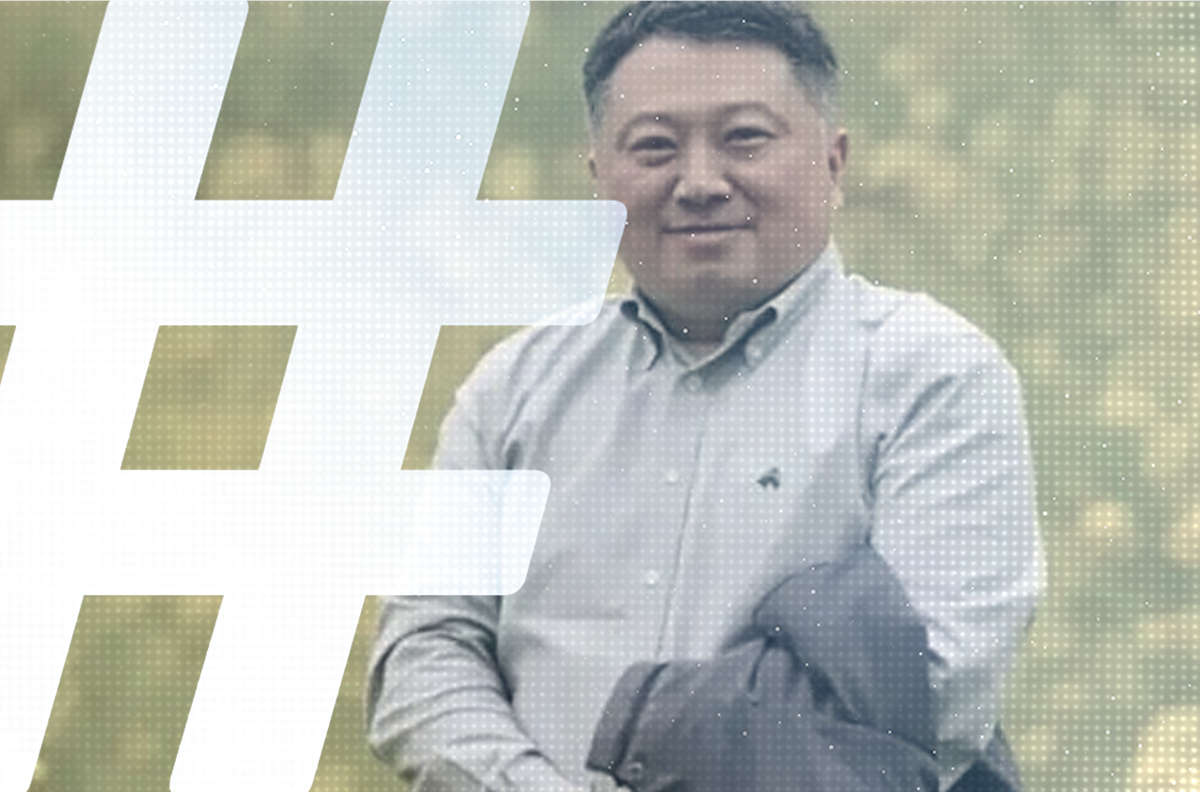There is a long-running debate in China about the regime of “stability preservation” — deep government spending to maintain domestic security by intercepting rights defenders and suppressing dissent — and whether it maintains stability or undermines it in the longer term. [More HERE and HERE].
For several years running, China’s spending on domestic security has surpassed its military spending, suggesting “stability preservation,” or weiwen (维稳), is a massive drain on resources.

[ABOVE: Are grassroots officials in China now handling too much? Environmental protection. Work safety. Economic development. And on top of it all, stability preservation. Image from Caixun.com.]
A recent letter of resignation posted to the internet by the deputy head of a township-level government in Sichuan now has many wondering about the immense pressures placed on the daily work of grassroots government officials by the stability preservation mandate. On July 5, The Beijing News published an interview with the deputy township leader, who estimated that a third of his work time was taken up by stability preservation:
A 28 year-old deputy township head in the city of Luzhou in Sichuan province resigned his post on July 1. He posted his feelings on the internet saying that over his past two years serving as deputy township head he had spent about four months a year doing stability preservation work (维稳) and only about four months doing “real things.” Aside from facing immense pressure and having a low income, there was the problem of “values” (价值观). He said that to this day the question remains for him: “I wonder if some stability preservation work is really about maintaining the stable development of the local economy, or whether it’s for the sake of [officials] maintaining their posts” (保帽子).
He said that he planned to become a lawyer after his resignation. . .
The Beijing News: Why did you decide to resign?
Deputy Township Head: It was a decision in the works for a long time. The choice to resign my official post as deputy township head was made rationally by weighing the advantages and disadvantages. There were two basic reasons. First, grassroots [government] affairs is so complex, and the pressure is immense. It’s tough and its hard to see any real results in the short term. It’s hard to accomplish anything through your own efforts alone. Secondly, the pay is low. My wages were just enough to pay for formula and diapers for my child. After working for six years I still relied on my parents to support my family.
The Beijing News: You said in your letter of resignation that this was also a question of values, that you couldn’t apply your personal values in your work. What did you imagine back then when you were selected to serve as deputy township head?
Deputy Township Head: After I finished my undergraduate in 2006, I worked on building projects in Guangzhou for a bit of time. Life on the go was really unstable. In 2007 I started working in the court system after taking employment examinations. I worked as a judge for a few years. It was later that I was successfully elected deputy township head.
My idea was that by serving as a judge or as a government official I might be able to use my work to advance justice and do good things for the people, helping the local [government] to improve the living environment and make sure people can benefit from their hard work. But in my six years of experience as a public servant I discovered that this was in fact not the case.
My work was extremely difficult, and the work of the grassroots cadres all around was extremely difficult, but change was very slow — it was hard to see any real results. For example, I cared a lot about transportation issues. I involved myself in road network construction, and projects started but couldn’t make progress. I was really disappointed.
The Beijing News: When did you start thinking about resigning? And what was it finally that drove you to resign?
Deputy Township Head: It was in January this year. My exhaustion had built up a long time. I was mentally and physically exhausted.
There was one thing that really affected me. From the second half of last year to January this year I spent most of my time and energy watching the Liu brothers, who were busy petitioning, but ultimately I was disciplined with an administrative warning (行政警告) because five people petitioned. This year too I went many times to cities outside the region to do stability preservation work [NOTE: He means he had to go deal with petitioners traveling to other cities with complaints originating in his township]. Every time I went out for stability preservation work I had to set other tasks aside.
The Beijing News: How much of your work time was taken up with stability preservation?
Deputy Township Head: I wasn’t specially tasked with stability preservation. The areas I was responsible for were safety, law-based administration, land issues — there was a lot of complicated stuff to do. But stability preservation took a big chunk of my time. Based on my experience, about four months out of every year is taken up with stability preservation. About two months are taken up with dealing with materials for inspections [by superiors], and another two months for meetings, study sessions, etcetera. So that leaves only about four months to do real work.
The Beijing News: Did stability preservation have a big impact on your work?
Deputy Township Head: Stability preservation wasted a lot of my time and energy. I wanted to do more real work. I wonder if some stability preservation work is really about maintaining the stable development of the local economy, or whether it’s for the sake of [officials] maintaining their posts.
The Beijing News: What gave you the most pressure in doing grassroots work?
Deputy Township Head: I was responsible for safety, and I had to cover everything from on-the-job safety to the general safety of the population and their property. Work on safety is also the most high-risk of government jobs. No matter how hard you work there’s no way to foresee how some accident might mean you’re held responsible.
The Beijing News: What did you find hardest about your work?
Deputy Township Head: I had no way to take care of my family. My son wasn’t even a year old. My wife and parents lived in the city, more than 300 kilometers from where I was working. It was a four-hour drive to head back home once a week. I often went home on Saturday nights. I would have to head back first thing Sunday. From May until the time I resigned there was almost two months in which I didn’t have a day off.
The Beijing News: Can you tell us exactly what you’re salary was?
Deputy Township Head: Every month my salary was 3,046 yuan, with a housing allowance of 422 yuan a month and phone subsidies of 400 yuan. At the end of the year I could look forward maybe to a performance bonus of several thousand yuan. But every month my son went through at least four packs of diapers at 138 yuan a pack, and four cans of formula at 209 yuan each (total 1,388). I don’t smoke or play cards. I don’t buy my own liquor. I still depended entirely on some support from my parents.
The Beijing News: How do you view your last six years as a public servant?
Deputy Township Head: I don’t deny that I’ve gained a lot from the last few years of work as a public servant. As a judge I tried more than 100 cases a year. And as a public servant I was able to do a few real things for the people. I don’t see myself as someone standing against the system, nor am I an idealist. I see myself as a rationalist. I decided to change my life. This was a rational choice.
The Beijing News: What impact did your resignation have on your colleagues and your family?
Deputy Township Head: At first my family didn’t agree, but when I explained the economic reasons to them they understood. My leaders also advised me, saying I shouldn’t be too anxious, that I should slow down, that work can only be done step by step. But I couldn’t wait anymore. Ultimately, leaders respected my personal choice.




















